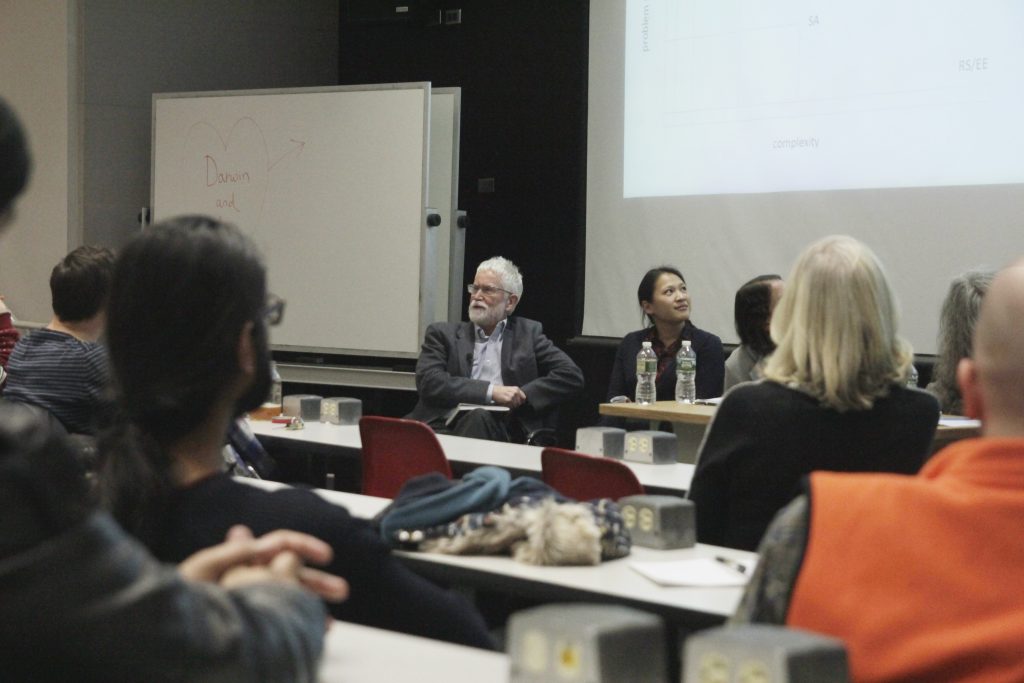
In honor of Charles Darwin’s birthday this past Sunday, the evolutionary studies program (EvoS) hosted a panel discussion titled “Darwin and Me: Evolution Across the Disciplines” in Academic Building A as part of its “Darwin’s Day” celebration. The department invited professors from various departments to speak about how evolutionary theory has affected their perspective, work and research.
The discussion was part of the EvoS seminar series, an event that brings in speakers and researchers every Monday to talk about how their work is impacted by evolutionary studies. This specific event focused on how evolutionary studies affects understanding in a multitude of disciplines, such as psychology, philosophy and engineering.
The panelists for this event included psychology professor Ann Merriwether, philosophy professor Lisa Tessman, assistant biology professor Jessica Hua, bioengineering professor David Schaffer and anthropology professor Rolf Quam. Adam Laats, an associate professor in the Graduate School of Education, was also supposed to be part of the panel but was not able to make it due to weather conditions.
The speakers were asked to focus on two central ideas: how they personally first encountered evolution and how evolutionary thinking has evolved in their discipline.
Many of the panelists said they were introduced to Darwinian theory early on in their education, but did not dive into the subject until later on in their studies. Merriwether first came across the doctrine during her undergraduate years, but it was not until she was in graduate school that evolutionary theory really played a part in her developmental psychology education.
“My first seminar in grad school was developmental psychology theory and we got to pick which theorist we wanted to study, and I picked Irenäus Eibl-Eibesfeldt because I thought his name was cool,” Merriwether said. “He ended up rocking my world. I read his book, ‘Human Ethology,’ and to this day, I still think about its findings.”
The professors discussed the necessity of evolutionary studies, including moral plurality, artificial intelligence and ecotoxicology. They all mentioned how understanding natural selection and Darwinism can help identify the root of many behaviors and actions in both humans and other living organisms, which helps them understand findings made in their research. Quam brought up the importance of evolution when studying the emergence of language.
“The field of biological anthropology is very much explicitly united by the paradigm of evolution,” Quam said. “Everyone who works as a biological anthropologist believes in evolution and uses it as an explanatory framework to understand human behavior, the past, the present, etc. It’s very essential to everything we do.”
Amanda Guitar, a fourth-year Ph.D. candidate studying biological anthropology, said the panel was an effective way to learn about the importance of evolutionary studies in various areas of academia.
“As someone who has studied evolution for years now, I think it is absolutely a crucial theory for understanding everything,” Guitar said. “It is just wildly applicable. Unfortunately though, our evolution literacy in this country is far too low, so discussions like this that bring people together from different disciplines to talk about how an evolutionary framework can apply across multiple fields is really important.”
Brian Perriello, a senior majoring in biology and the secretary of the Evolutionary Studies Student Association, attended the lecture because he thought it would be interesting to hear how professionals in different fields approach evolution.
“Evolutionary theory is very explanatory for the behavior of human[s], animals and the rest of life,” Perriello said. “Many of the ultimate causes of our behavior are due to selection. By understanding the topic, we can understand a lot about humanity, which is vital in all different areas of research.”


